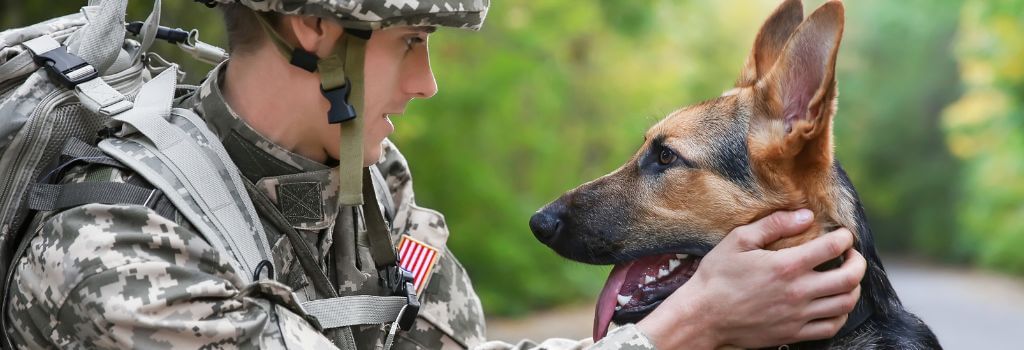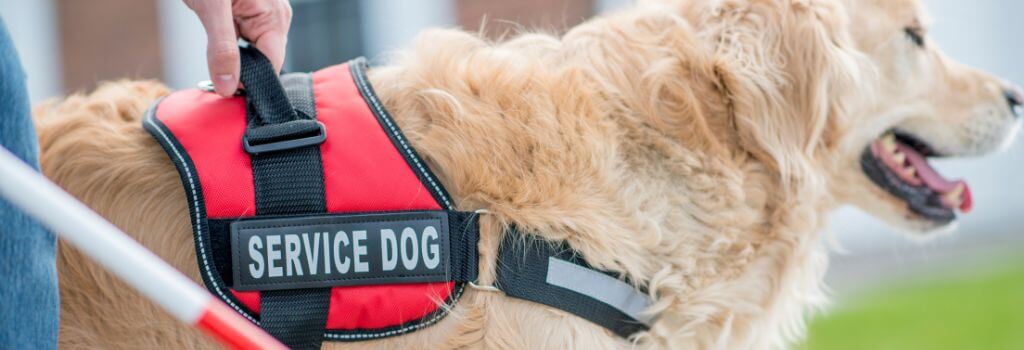Every Memorial Day, a solemn reverence washes over the nation. We pause to remember the brave men and women who have fallen in service to our country, their sacrifices a stark reminder of the price of freedom. But on this day of remembrance, let us also extend our gratitude to another silent group of heroes: working dogs.
These canine companions are more than just loyal pets. They are highly trained professionals who put their lives on the line to protect us, find the lost, and guide those in need. While military and law enforcement K-9 units often take center stage, the spectrum of service for working dogs stretches far wider, encompassing a diverse range of roles, each carrying its own unique set of challenges and triumphs. As veterinarians, we’d like to honor these brave heroes — especially those who gave their lives in the line of duty — on Memorial Day (and every day).
The Spectrum of Working Dogs
Not all heroes wear capes. In the world of service, some wear fur and wag their tails! Working dogs come in all shapes and sizes, each with a specialized skill set honed through rigorous training. From navigating bustling city streets to scaling treacherous mountains, these dogs dedicate themselves to a life of service, assisting humans in a remarkable range of tasks.

Types of working dogs who help humans every day include:
- Military and Law Enforcement K-9 Units: These courageous canines are a crucial line of defense in our world. They sniff out explosives before they can detonate, track missing persons through harsh environments, and apprehend criminals with unparalleled speed and precision. Their keen sense of smell and unwavering loyalty make them invaluable partners on the job. However, this dedication comes with inherent risks. Exposure to explosives can lead to hearing loss and respiratory problems in these dogs. The physical strain of apprehension work can cause joint injuries.
- Search and Rescue Dogs: When disaster strikes or a loved one goes missing, search and rescue dogs are beacons of hope amidst the chaos. Trained to locate missing persons in the most challenging environments, these dogs work tirelessly alongside their human partners. Their incredible sense of smell allows them to locate survivors even under layers of debris or snow. Unfortunately, these harsh environments can take a toll on their health. Exposure to extreme temperatures, smoke inhalation, and potential injuries are major concerns.
- Guide Dogs and Service Animals: For individuals with disabilities, guide dogs and service animals are not just companions but lifelines. These specially trained dogs provide assistance with tasks such as navigation, mobility, seizure alerts, and even emotional support. Their calming presence and unwavering support offer an invaluable sense of independence and security to their handlers.
The specific physical and mental demands placed on guide and service dogs vary depending on their role. Guide dogs require excellent vision, focus, and stamina for navigating busy streets. Service animals assisting individuals with mobility issues may need specialized training to handle balance challenges and require a strong, healthy musculoskeletal system.
Beyond the Battlefield: The Role of Veterinarians
Preventative care is the cornerstone of keeping working dogs healthy and able to serve. Just like any athlete, these canines depend on a robust healthcare plan to perform their duties effectively. Regular checkups allow veterinarians to detect potential health issues early on, preventing them from developing into debilitating conditions that could sideline these working heroes. Keeping vaccinations up-to-date is critical, especially for working dogs deployed in high-risk environments where exposure to diseases is a concern.
Beyond routine care, working dogs require specialized preventative measures tailored to their specific roles. For example, avalanche dogs who navigate treacherous mountain slopes benefit from regular joint checkups and specialized conditioning routines to maintain optimal mobility in the face of challenging terrain. Police K-9 units, subjected to rigorous training and potentially dangerous apprehensions, require comprehensive dental care to ensure a strong bite force, which is crucial for subduing suspects. Veterinarians work closely with trainers and handlers to create individualized care plans that address the unique risks associated with each type of work. This expertise ensures that working dogs can perform their duties with confidence and minimal health concerns.
The emotional toll on veterinarians who care for these animals is significant. Witnessing the dedication and sacrifices of both the working dogs and their handlers creates a deep bond. The responsibility of maintaining their health and well-being adds a profound layer to veterinary care. Veterinarians share in the triumphs of a successful search and rescue mission, celebrate positive results in training exercises, and mourn the loss of a canine hero who has fallen in the line of duty. As veterinarians, we take great pride in caring for working dogs and are honored to play a small role in ensuring they can do their jobs safely and effectively.

Honoring All Working Dogs on Memorial Day
On Memorial Day, let us honor and extend gratitude to all the working dogs who have gone before us. Their service contributed immensely to public safety, disaster response, and individual well-being. We recognize the sacrifices they made, the risks they faced, and the unwavering loyalty they offered during their lives. But our appreciation must extend beyond words.
Many organizations train and care for working dogs, often relying heavily on donations and volunteer support. Supporting these organizations is one of the best ways to honor the working dogs who gave all.
Here are some ways you can contribute:
- Donate to a K-9 Unit Training Program: These programs require significant resources to train both the dogs and their handlers. A financial contribution can help cover the costs of equipment, training facilities, and veterinary care.
- Support a Search and Rescue Dog Association: These associations rely on public funding to maintain their search and rescue teams. Donations can help with food, training equipment, travel expenses, and specialized veterinary care for the dogs.
- Volunteer Your Time: Many organizations welcome volunteers to assist with tasks like fundraising, dog walking, or administrative support.
- Spread Awareness: Share information about working dogs on social media and talk to friends and family about their contributions.
By supporting these organizations, we can contribute to the well-being of these incredible animals and the vital services they provide.
Closing Thoughts: A Day of Remembrance, A Day of Gratitude
Memorial Day is a day to remember those who have fallen in service to our country. But it can also be a day to honor military dogs and other working dogs who gave their lives helping humans. These canine heroes stood alongside their human partners, facing danger, offering comfort, and saving lives. Let us honor them by recognizing their sacrifices, supporting their well-being, and appreciating the vital role working dogs play in our communities.
If you have questions and you'd like to reach out to us, you can call us directly at (641) 758-3333, or you can email us at [email protected]. Don't forget to follow us on social media Facebook, Instagram.
This information was first seen on GeniusVets.
